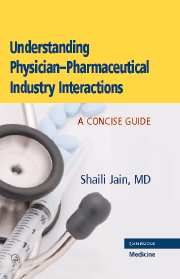Book contents
- Frontmatter
- Contents
- Acknowledgments
- Foreword
- Introduction
- 1 Gifts from the Pharmaceutical Industry to Physicians: Do They Influence your Prescribing?
- 2 Ethical Considerations of Receiving Gifts from the Pharmaceutical Industry
- 3 One on One: An Analysis of the Physician–Pharmaceutical Company Representative (PCR) Detailing Interaction
- 4 Medical Academia and the Pharmaceutical Industry
- 5 Teaching Physicians in Training about Pharmaceutical Industry Promotion
- 6 Continuing Medical Education: How to Separate Continuing Medical Education from Pharmaceutical Industry Promotion
- 7 Professional Policies on Physician–Pharmaceutical Industry Interaction (PPII)
- 8 Preserving Professionalism: Patients' Perceptions of Physicians' Acceptance of Gifts from the Pharmaceutical Industry
- 9 To Sample or Not to Sample? The Use of Pharmaceutical Industry–Supplied Medications in Medical Practice
- 10 Physician–Pharmaceutical Industry Interactions (PPIIs), the Law and the Media
- 11 Direct-to-Consumer Advertising (DTCA)
- 12 Pharmaceutical Industry Interactions with Health Care Professionals: A Global Perspective
- 13 Internet Resources for Teaching about PPII and Independent Sources of Information about Prescription Medicines
- Appendix I
- Appendix II
- Index
- References
10 - Physician–Pharmaceutical Industry Interactions (PPIIs), the Law and the Media
Published online by Cambridge University Press: 03 March 2010
- Frontmatter
- Contents
- Acknowledgments
- Foreword
- Introduction
- 1 Gifts from the Pharmaceutical Industry to Physicians: Do They Influence your Prescribing?
- 2 Ethical Considerations of Receiving Gifts from the Pharmaceutical Industry
- 3 One on One: An Analysis of the Physician–Pharmaceutical Company Representative (PCR) Detailing Interaction
- 4 Medical Academia and the Pharmaceutical Industry
- 5 Teaching Physicians in Training about Pharmaceutical Industry Promotion
- 6 Continuing Medical Education: How to Separate Continuing Medical Education from Pharmaceutical Industry Promotion
- 7 Professional Policies on Physician–Pharmaceutical Industry Interaction (PPII)
- 8 Preserving Professionalism: Patients' Perceptions of Physicians' Acceptance of Gifts from the Pharmaceutical Industry
- 9 To Sample or Not to Sample? The Use of Pharmaceutical Industry–Supplied Medications in Medical Practice
- 10 Physician–Pharmaceutical Industry Interactions (PPIIs), the Law and the Media
- 11 Direct-to-Consumer Advertising (DTCA)
- 12 Pharmaceutical Industry Interactions with Health Care Professionals: A Global Perspective
- 13 Internet Resources for Teaching about PPII and Independent Sources of Information about Prescription Medicines
- Appendix I
- Appendix II
- Index
- References
Summary
Jack left the faculty meeting and headed to clinic. He was not looking forward to his next patient, Mrs. Allison. She was a middle-aged woman with poorly controlled hypertension and Type II diabetes. She had been seen by a string of physicians before him and tried on several different medications. She always left Jack feeling a little frustrated, as she spent more than the allotted appointment time complaining about medication side effects and how “no one was helping her,” yet she had questionable compliance with her medication regime and had not lost weight as he had strongly recommended many months ago.
The debate about the nature of the relationship between the medical profession and the pharmaceutical industry (PI) is a very public one. The negative aspects of the relationship have come under intense criticism in major national newspapers. Such articles have originated from a variety of sources, from medical school faculty as well as journalists. Faculty have publicly highlighted concerns over the influence of PI on medical trainees' prescribing behavior, as well as over the influence of PI on physicians through industry sponsorship of CME, free gifts and food.
With the PI consistently topping the list of the most profitable industries in the United States, its practices have come under much scrutiny in the past several years.
- Type
- Chapter
- Information
- Understanding Physician-Pharmaceutical Industry InteractionsA Concise Guide, pp. 52 - 58Publisher: Cambridge University PressPrint publication year: 2007



